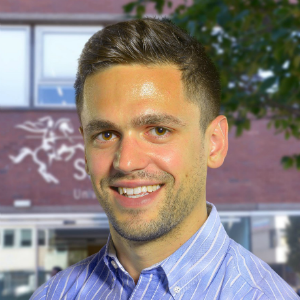
Dr Daniel Burrage, specialty registrar in clinical pharmacology, St George’s Hospital, London
What do you do? and what is a typical week for you?
I am a clinical pharmacology and general medicine registrar with a sub-specialty interest in stroke medicine. My time is therefore split between these 3 roles; which I have done in blocks of 6-12 months in my training to date. A typical week as the general medical registrar would be on the acute medicine unit (AMU), taking referrals from the emergency department, ward rounds on AMU or working in ambulatory care. As a stroke registrar I’m based on the hyperacute stroke unit attending thrombolysis calls and on the acute stroke unit looking after patients in the days-to-weeks following their stroke. My clinical pharmacology time is focused on research: recruiting and reviewing patients for industry and investigator-led trials in our clinical research facility, and establishing my own research. This includes developing patient and public involvement in research locally, grant writing, protocol development, ethics applications and recruitment, and reviewing patients for my own study. Mixed in to all this I also teach on our MBBS, BSc, and MPharm courses; lecturing, examining and supervising students. This all makes for a busy but varied training programme.
What qualifications and experience do you have?
Following medical school where I did an intercalated BSc, I completed the usual foundation programme, and then did core medical training as part of an NIHR Academic Clinical Fellowship from ST1-3. During this time, I also completed an MSc in Medical Education. In order to do stroke medicine, I have taken an Out of Programme Training period (OOPT) for 1 year. I am now again out of programme for research to complete my PhD (an OOPR this time) as part of an NIHR Doctoral Research Fellowship.
What’s the most interesting aspect of your job?
Clinical pharmacology is a varied career, done differently at different hospitals. I like that it allows you to be a clinical academic and develop a subspecialty interest whilst also remaining a generalist. Teaching and research are integral to the work.
What are your research interests?
My research interest is in cerebral small vessel disease, reflecting my interest in stroke medicine. The beauty of clinical pharmacology is that it’s not an organ-specific specialty at the start so your research can take you anywhere you like.
What one piece of advice would you give to someone seeking a career in clinical pharmacology?
Embrace the varied training opportunities a career in clinical pharmacology can offer – hypertension, toxicology, clinical trials, respiratory, stroke, local and national management/leadership (e.g. NICE, MHRA), medical education… the opportunities are endless.